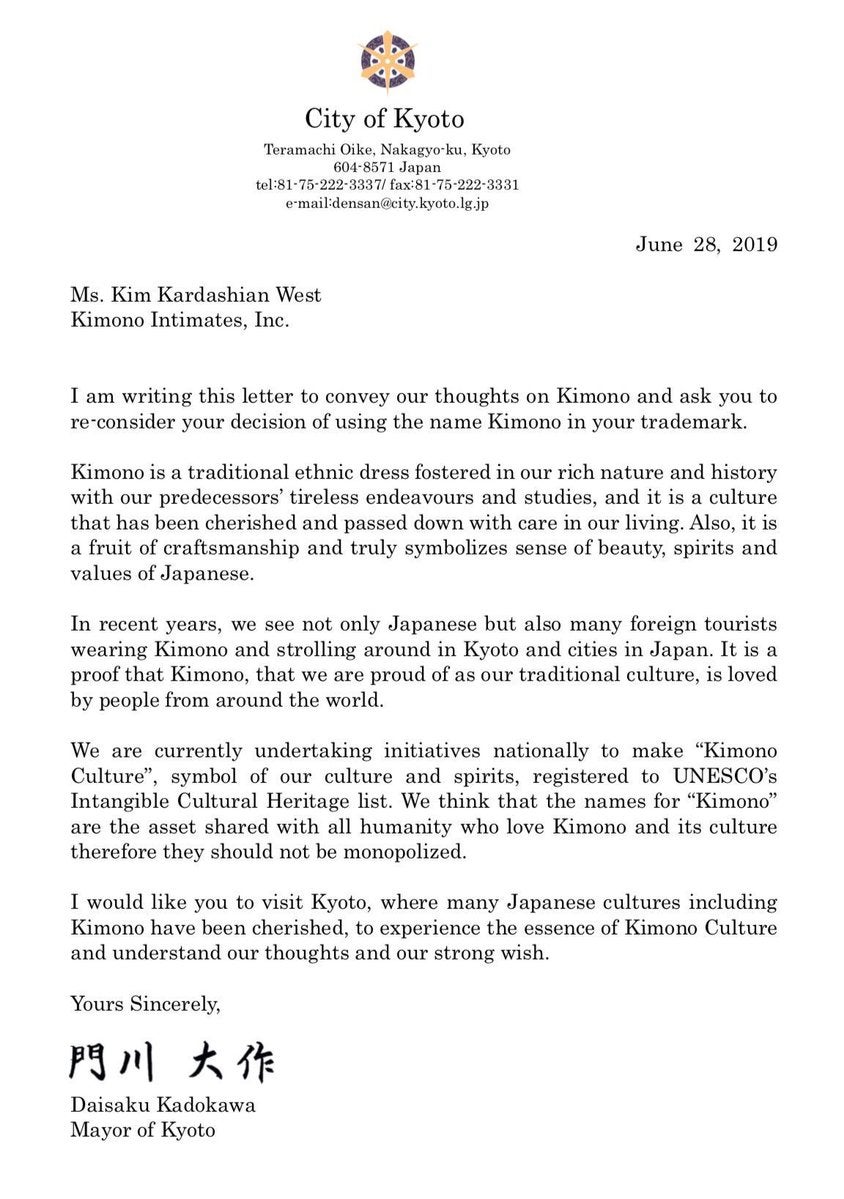Read the letter from Kyoto’s mayor to Kim Kardashian protesting “Kimono” shapewear
Influencer extraordinaire Kim Kardashian West got mail on June 28 from the mayor of Kyoto, Japan about her newly unveiled shapewear line, which she calls “Kimono.” In an open letter on Facebook, Kadokawa Daisaku said it is his ”strong wish” that KKW rethink her use of the name.


Influencer extraordinaire Kim Kardashian West got mail on June 28 from the mayor of Kyoto, Japan about her newly unveiled shapewear line, which she calls “Kimono.” In an open letter on Facebook, Kadokawa Daisaku said it is his ”strong wish” that KKW rethink her use of the name.
The celebrity appears to have a trademark in the US for the brand “Kimono Intimates” using a particular font. She doesn’t now own the word “kimono” exclusively. However, her choice of name has upset many, who say KKW is appropriating from a culture that is not hers.
On Twitter, people have been vociferously protesting the Kimono brand since it was announced earlier in the week, with the hashtag #KimOhNo. The fact that her line is pretty much the opposite of kimonos, consisting of formfitting shape-wear in skin tone colors rather than colorful and intricate silken robes, isn’t really helping the matter. Appropriation for the sake of wordplay can’t even be characterized as a tribute to Japan or a nod to the culture.
Although the shapewear business is booming, and the influencer’s announcement of her brand was well-timed from a business perspective, her decision to try to capitalize on the overlap between her name and a traditional Japanese garment could not have come at a worse time. This incident may just prove that even for the seemingly invincible and unflappable KKW, there is sometimes such a thing as bad press.
Designers are increasingly being called to task for taking too much inspiration from traditions that don’t belong to them, and governments aren’t too busy to opine on these designs. Earlier in June, Carolina Herrera’s new resort line, which uses traditional Mexican embroidery techniques, caught the attention of Mexican cultural minister Alejandra Frausto. The brand called it a “tribute” to Mexico but the internet and the Mexican representative considered it more akin to theft.
The Kyoto mayor didn’t use the precise phrase “cultural appropriation.” But he did strongly suggest that Kardashian should back off, explaining that the “kimono is a traditional ethnic dress” and is the product of “tireless endeavors and studies” by the Japanese. He noted that the kimono is beloved not only locally, but by people around the world, and that the traditional style is the “fruit of craftsmanship.” Kadokawa says that the style truly symbolizes Japanese culture, the national sense of beauty, and the country’s values.
He revealed that Japan is seeking to trademark the word “kimono” as well. The country wants to create the brand “Kimono Culture” and register it to Unesco’s Intangible Cultural Heritage List. He said that the kimono is an asset shared by all of humanity and that the name should not be monopolized.
Still, the mayor was polite throughout and ended by inviting KKW to check out the real deal by visiting his city. You can read the letter in full below:
